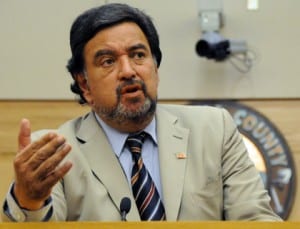
Gov. Bill Richardson (Photo by Heath Haussamen)
The fact that Gov. Bill Richardson and others won’t face criminal charges following a yearlong investigation into pay-to-play allegations doesn’t mean they should consider themselves exonerated, U.S. Attorney Greg Fouratt wrote in a letter sent to witnesses before the grand jury.
That’s according to the New York Times, which reported Thursday evening on the official letter.
“In the letter, Mr. Fouratt’s office said he would not pursue criminal charges, but it added that ‘pressure from the governor’s office resulted in the corruption of the procurement process’ and said that the letter ‘should not be interpreted as exoneration of any party’s conduct in that matter,’” the Times article states.
The newspaper did not release the letter or quote further from it, and did not elaborate on the allegation that pressure from the governor’s office corrupted the process of selecting a company for a state contract several years ago.
Richardson had a completely different take on the ending of the probe into allegations that CDR Financial Products received the lucrative state investment contract from the New Mexico Finance Authority in exchange for campaign contributions to Richardson and two political action committees he started.
“Governor Richardson has known all along that neither he nor any staff members committed any transgressions during their successful fundraising back in 2004,” Deputy Chief of Staff Gilbert Gallegos said Thursday in a statement released by the governor’s office. “The U.S. Attorney’s thorough and lengthy investigation has apparently determined the same thing — that no indiscretions occurred.”
The Times’ report didn’t say when Fouratt’s letter was sent to witnesses. As of Thursday, Richardson hadn’t been told that no charges would be filed.
“While the U.S. Attorney’s Office has not notified Governor Richardson about the completion of its investigation, it appears that no action will be taken as a result of the year-long inquiry,” Gallegos said in the prepared statement.
What’s clear: The case has been dropped
For weeks, sources have shared with me at times conflicting rumors about whether the case was proceeding toward indictments or being dropped and whether, as it gradually became clear that the statute of limitations was about to expire without action, officials in Albuquerque or Washington were behind the apparent decision to drop the case.
Early Thursday, The Associated Press quoted a source who put the decision to drop the case on officials in Washington.
“It’s over. There’s nothing. It was killed in Washington,” the AP quoted the source as saying.
The GOP was quick to raise questions about that. State GOP Chairman Harvey Yates Jr. asked whether the decision was made “contrary to the advice of experienced, non-political, career prosecutors and the FBI.”
Later Thursday, the Washington Post published a story quoting a source who concurred that the decision was made in Washington and said it was made by “career prosecutors” who “concluded that an indictment was not warranted.”
Then came the Times’ report about Fouratt’s letter. It’s noteworthy that the U.S. attorney’s letter apparently doesn’t back up the Post source who said prosecutors concluded an indictment wasn’t warranted.
In addition, the Times reported that the decision was Fouratt’s but that “top Justice Department officials concurred” with him.
The discrepancy, sources said, is likely indicative of intense behind-the-scenes wrangling between officials in Albuquerque and Washington, and the full details may never be known publicly.
What’s clear is that the case has been dropped. What isn’t entirely clear is why, and who exactly made the decision.
Update, 1:30 a.m.
The Albuquerque Journal has more details on the letter, which the newspaper says was written to defense lawyers in the case. Most noteworthy: The letter states that the decision to drop the case now “shall not preclude the United States or the grand jury from reinstituting such an investigation without notification if … circumstances warrant …”